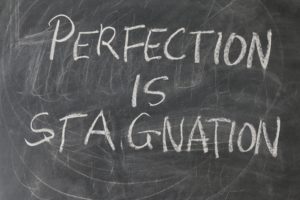So let's call it imperfect perfectionism...


“Stop trying to ‘fix’ yourself; you’re NOT broken! You are perfectly imperfect and powerful beyond measure.” — Steve Maraboli

Now, let's take a look at perfectionism.
What do I mean when I describe myself as a perfectionist in recovery? I mean, honestly, is it even possible to be perfect? Of course not, so why then could a person be in recovery?
The definition of perfectionism, according to Google, is “the need to be or appear to be perfect, or even believe that perfection is achievable.”
So, in other words,
Perfectionism is not viewed as a weakness but as a personality trait. You can manage your perfectionism in a number of ways to make it serve you rather than against you. I discovered perfectionism about fifteen years ago before even realizing it, and for the past years, I think I have been on the road to recovery. It never ends, and I have a ton of work to accomplish. My goal is to help you overcome perfectionism by sharing my experience and increasing your self-awareness.
What is it like to be a perfectionist?
The persistent striving for success or excellence and basing your self-worth on this belief has negative consequences for your goals and life in general.
So, I’ve read…

Ok, I am generalizing here. Although once you read a ton of articles on the definition of these categories, you’ll see what I mean. These examples are how I perceived myself in the perfectionism world.
The links I have may change periodically or I’ll just keep adding to the list. A lot of information is repetative, however, the delivery of the information resonates with people all differently.
Self-critical perfectionists
~ the fear of being rejected because of their own ideas of success and achievement
It’s all to easy to fall into the ambush of self-critical perfectionism, constantly feeling as though we’re never good enough. I know I can and have set unrealistic expectations for myself, aiming for no mistakes in everything I did or being afraid as I had no idea what was perfect. And when we inevitably fall short, we use it as confirmation or an excuse that we’re just not good enough.
This type of triangulation can be incredibly damaging to our self-esteem and mental well-being. I realized my mental well being was in jeopardy when I developed an eating disorder. Read more
We become our own harshest critics, nitpicking every conceived mistake and what we perceive as not good enough, no matter how small. The pressure to meet these crazy, impractical standards, sits on our shoulders like the little devil constantly chatting nonsense in our ears, leading to stress, anxiety, and feelings of incompetence.
It’s important to recognize that perfection is an impossible standard. It is multidimensional and has varying degrees and varies experiences from each individual to each individual struggling with perfectionism.
We are all humans, with our own strengths and weaknesses. Embracing our imperfections and learning from our mistakes is a more realistic and healthy approach to personal growth.
Instead of viewing failure as a part of who we are, we can choose to see it as a way for personal growth.
However…
Let’s not be naïve. It is not easy to just turn the switch and tell yourself, “Okay, today I am not going to be negative, or today I am learning, or today I am not a failure.
By practicing self-compassion and setting more realistic goals, we can break free from the cycle of self-critical perfectionism and cultivate a healthier relationship with ourselves.
Self-critical perfectionism can be a challenging mindset to work around, especially when we are overly critical of ourselves. One way I try to overcome this type of perfectionism is by replacing self-critical thoughts with realistic, positive, and helpful ones. Instead of focusing on our perceived ideals, I try to acknowledge my efforts and progress.
I emphasize TRY!
Remember that making mistakes is a natural part of growth and learning. I keep trying to give myself permission to make mistakes and find a more balanced approach to achieving my goals at a pace where I can be successful. Trust in your abilities and celebrate the journey, knowing that you are worthy of self-acceptance and kindness.

“Stop trying to ‘fix’ yourself; you’re NOT broken! You are perfectly imperfect and powerful beyond measure.” — Steve Maraboli

Now, let's take a look at perfectionism.
What do I mean when I describe myself as a perfectionist in recovery? I mean, honestly, is it even possible to be perfect? Of course not, so why then could a person be in recovery?
The definition of perfectionism, according to Google, is “the need to be or appear to be perfect, or even believe that perfection is achievable.”
So, in other words,
Perfectionism is not viewed as a weakness but as a personality trait. You can manage your perfectionism in a number of ways to make it serve you rather than against you. I discovered perfectionism about fifteen years ago before even realizing it, and for the past years, I think I have been on the road to recovery. It never ends, and I have a ton of work to accomplish. My goal is to help you overcome perfectionism by sharing my experience and increasing your self-awareness.
What is it like to be a perfectionist?
The persistent striving for success or excellence and basing your self-worth on this belief has negative consequences for your goals and life in general.
So, I've read...

click the links below to navigate page
Ok, I am generalizing here. Although once you read a ton of articles on the definition of these categories, you’ll see what I mean. These examples are how I perceived myself in the perfectionism world.
The links I have may change periodically or I’ll just keep adding to the list. A lot of information is repetative, however, the delivery of the information resonates with people all differently.
Self-critical perfectionists
~ the fear of being rejected because of their own ideas of success and achievement
It’s all to easy to fall into the ambush of self-critical perfectionism, constantly feeling as though we’re never good enough. I know I can and have set unrealistic expectations for myself, aiming for no mistakes in everything I did or being afraid as I had no idea what was perfect. And when we inevitably fall short, we use it as confirmation or an excuse that we’re just not good enough.
This type of triangulation can be incredibly damaging to our self-esteem and mental well-being. I realized my mental well being was in jeopardy when I developed an eating disorder. Read more
We become our own harshest critics, nitpicking every conceived mistake and what we perceive as not good enough, no matter how small. The pressure to meet these crazy, impractical standards, sits on our shoulders like the little devil constantly chatting nonsense in our ears, leading to stress, anxiety, and feelings of incompetence.
It’s important to recognize that perfection is an impossible standard. It is multidimensional and has varying degrees and varies experiences from each individual to each individual struggling with perfectionism.
We are all humans, with our own strengths and weaknesses. Embracing our imperfections and learning from our mistakes is a more realistic and healthy approach to personal growth.
Instead of viewing failure as a part of who we are, we can choose to see it as a way for personal growth.
However…
Let’s not be naïve. It is not easy to just turn the switch and tell yourself, “Okay, today I am not going to be negative, or today I am learning, or today I am not a failure.
By practicing self-compassion and setting more realistic goals, we can break free from the cycle of self-critical perfectionism and cultivate a healthier relationship with ourselves.
Self-critical perfectionism can be a challenging mindset to work around, especially when we are overly critical of ourselves. One way I try to overcome this type of perfectionism is by replacing self-critical thoughts with realistic, positive, and helpful ones. Instead of focusing on our perceived ideals, I try to acknowledge my efforts and progress.
I emphasize TRY!
Remember that making mistakes is a natural part of growth and learning. I keep trying to give myself permission to make mistakes and find a more balanced approach to achieving my goals at a pace where I can be successful. Trust in your abilities and celebrate the journey, knowing that you are worthy of self-acceptance and kindness.
Here's a quote I love
“Forgive your past self
Believe in your current self
Create your future self.”
Others-oriented perfectionists
~they have high expectations of others and are themselves critical and judgmental of others.
Others-oriented perfectionism revolves around the belief that it is crucial for others to be perfect in our eyes and make no mistakes. When we have this mindset, we place importance on the performance of those around us, setting high standards and expecting nothing less than what our expectations are.
Unfortunately, I think I did this to my kids. OK wait! Not to them, but more like I demonstrated this belief, and then in return, they believed it.
Consequently, we then tend to be overly critical of individuals who fall short of meeting these lofty expectations.
This type of perfectionism can create a toxic environment where individuals constantly feel pressured to meet unrealistic expectations set by those around them. It can lead to feelings of inadequacy and anxiety, as the fear of not living up to these expectations.

I truly feel bad that I didn’t have the knowledge that this belief is inaccurate. Here, even as I write this, I am demonstrating perfectionism because I think I failed my kids somehow. They now must undo their own ideals of perfectionism and change their mindset.
I know I am not a failure.
I know I have done a ton for my kids, that is good.
I know that they know they are loved and supported.
When we have the mindset that others need to be perfect because the focus is on critical elements instead of supporting ones, we can strain relationships and slow down personal growth.
It is important that we recognize the negative effects an others-oriented perfectionism trait can have and work on creating a more understanding and empathic mindset.
This FOR A FACT (my factual experience) takes Practice!
Practice catching yourself and correcting yourself at the same moment.
If we can embrace imperfections as a part of life, then the hope is that we will learn to grow in our ability to show compassion and enforce connection.
This in turn gives others the chance to support one another in their own journeys of self improvement and growth. Remember, we don’t want to demand perfection but rather encourage acceptance and kindness.
Socially prescribed perfectionists
~ Believe that other people expect them to be perfect and that these other people will be highly critical of them if they fail to meet expectations.
This is when life can feel like an endless cycle of pressure and self-doubt. When we believe that others expect us to constantly be flawless, it can be suffocating.


When I was working at the lodge in my younger years, I was constantly in the eyes of customers, representing my parents and our family’s reputation. If I was doing anything that was considered “bad,” such as, smoking, sneaking out, sipping a drink, being a bit rude, sleeping in, not remembering someone, etc. then I was a bad person. Sometimes, my dad thought it would be good punishment to shame me in front of others when I got caught doing something that was not considered good behavior. I even remember saying once, that I wished he would just spank me because then the pain would just be gone after a few moments.
Its interesting when I look back now. I knew he was very proud of me, and I also knew he loved me because he showed it in many other ways. How that one behavior of his affected my way of thinking in my younger life. It wasn’t until I was older that I realized there was another way to think.
We think that anything other than perfection will equal failure and that we have let others down somehow.
This mindset can take a toll on our mental health, causing anxiety and stress as we chase an elusive ideal. This fear of not meeting someone else’s expectations leaves us with this endless need for validation.
Adaptive perfectionism
What do we mean when we say adaptive perfectionism? I remember a friend saying to me, he didn’t understand all these big words and they confuse him. I have to admit, a bit to me as well. So I tried to figure out what they actually meant in my world.
According to the Collins Dictionary, adaptive is when one has the ability to change their ideas and behavior in order to deal with new situations.
So, what, then, is adaptive perfectionism?

In the world of perfectionism, I found that it just boils down to striving to be better, to do your best, and not punishing yourself if things don’t go quite as planned.
As a recovering perfectionist, I now practice adaptive perfectionism when I strive to achieve my goals and get excited about the journey to get there. The difference is I have an awareness and acceptance that all things may not be accomplished, and adjustments will need to be made, plans changed, etc.
As I practice being an imperfect perfectionist, I noticed that in the past I was being agreeable. I would either do things to feel accepted, or say things to be agreeable, thinking others would then think I was cool and like me, or I would put up with being treated a certain way because I didn’t want to rock the boat.
I didn’t even know perfectionism was a thing, or even realize there was negativity attached to its meaning until I started to feel unhappy and stressed in my own life.
Until I realized that this was not the way I wanted to feel every day, I did not realize I needed to make a change. This is called maladaptive perfectionism. I’ll explain what I know about that below.
As an adaptive perfectionist, I look for success in my life and, with risk, complete what I set out to do. Instead of freaking out because the outcomes aren’t exactly how I imagined them, I adapt and am flexible with the outcome.
The easiest way I stay flexible and adaptive is to remind myself of my strengths and know my limitations so I can set my goals more realistically. This also allows for balance, mental growth, and space.
 Trust me when I say this.
Trust me when I say this.
It takes practice!
As an adaptive perfectionist, I will look for success in my life and, with risk, complete what I set out to do. Instead of freaking out because the outcomes aren’t exactly how I imagined them, I adapt and am flexible with the outcome.
The easiest way I stay flexible and adaptive is to remind myself of my strengths and know my limitations so I can set my goals more realistically. This also allows for balance, mental growth, and space.
Maladaptive perfectionism
Maladaptive is when a person is profoundly self critical and has no self esteem or very low self esteem because of high expectations that are unrealistic. The individual can then feel anxiety, hopelessness, and even depression.
As an individual can have one of the perfectionism traits, two, or a combination of all three, it really depends on the person. I have a combination of all 3 and they would pop up in various ways. I would say that until recently, this was the way I practiced perfectionism. It took its toll on my well-being as I set high standards for myself, and when I couldn’t reach them, I considered myself a failure.
Of course, when I did not actually fulfill my goal, or I didn’t meet my standards and failed, I felt self doubt and a lack of confidence, which in turn brought other challenges with it. To avoid falling into this self doubt failure loop, I would procrastinate because I thought the other things I set out to do would fail anyway.
Omgawd!!!
The terminology alone freaks me out!

I would do the task, but I thought it wasn’t good enough. I didn’t do it; I thought I was a failure. I procrastinate; I would have excuses. No matter what standards I set for myself, I would be overly critical and self sabotage.
My need to control my environment was crazy, and when things didn’t go my way, I was very negative.
Is it possible to have the positive side of perfectionism? Yes, I think so. It just takes practice. It is always good to have goals, as they help one stay progressive and grow. You just don’t want these goals to sit in a stagnant file, as it can cause a whole new category of negative influences.
What I learned and how I got started
A few years ago, I learned new methods that I now refer to as the New Dynamics of Life Skills. Actually, it was an entirely different way of thinking. For six weeks, we spent eight hours a day, five days a week, in a classroom with a group of individuals. After completing assignments that were given to us, we, as a group, got together to discuss the work and any insights that had emerged. I thought I was the outgoing, gregarious person here. All of a sudden, there was someone else who did not think the same thing about me and was not hesitant to express it.
HOLY Shit!
My perspective on language, words, thoughts, and the actual functioning of communication has truly changed as a result of the experience, allowing me to gain knowledge on how to examine empathy and sympathy more closely. To know what I really value and what my morals are.
Surely, now I know what comes up for me, such as a trigger, especially when faced with a task or confronted with feedback, that brings about self-awareness.
What is the point of this?
I think, when I read information about perfectionism, I realized how important it is to understand what causes perfectionism and how strategies that help challenge and overcome it are. I truly believed I had a concept, but this course helped me become more self-aware. I hope to share my journey of overcoming perfectionism and share information on how I am moving crap out of my way.
The right and responsible use of problem-solving techniques in the handling of personal matters is known as life skills. It appears that as our brains mature into adulthood, we lose the ability to solve problems.
In essence, these are the abilities that we already know and utilize. It is just that we do not always use them correctly. Having certain strategies in place can help you get through even the most difficult decisions if we truly want to make changes in ourselves, especially if what we are doing is not working. This new approach is when my true self-awareness. began.



